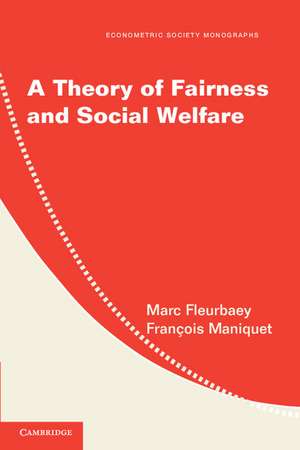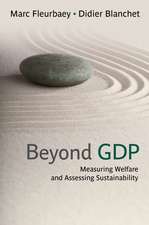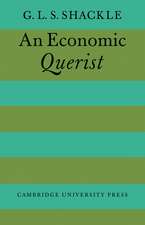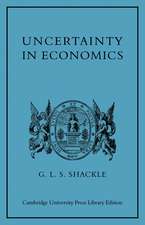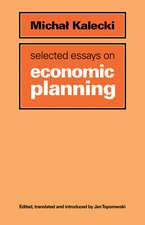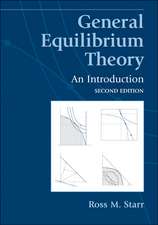A Theory of Fairness and Social Welfare: Econometric Society Monographs, cartea 48
Autor Marc Fleurbaey, François Maniqueten Limba Engleză Paperback – 12 iun 2011
| Toate formatele și edițiile | Preț | Express |
|---|---|---|
| Paperback (1) | 363.13 lei 6-8 săpt. | |
| Cambridge University Press – 12 iun 2011 | 363.13 lei 6-8 săpt. | |
| Hardback (1) | 743.44 lei 6-8 săpt. | |
| Cambridge University Press – 12 iun 2011 | 743.44 lei 6-8 săpt. |
Din seria Econometric Society Monographs
- 14%
 Preț: 2544.95 lei
Preț: 2544.95 lei -
 Preț: 256.66 lei
Preț: 256.66 lei -
 Preț: 441.20 lei
Preț: 441.20 lei -
 Preț: 308.05 lei
Preț: 308.05 lei -
 Preț: 366.95 lei
Preț: 366.95 lei -
 Preț: 258.04 lei
Preț: 258.04 lei -
 Preț: 287.28 lei
Preț: 287.28 lei -
 Preț: 326.53 lei
Preț: 326.53 lei -
 Preț: 371.03 lei
Preț: 371.03 lei -
 Preț: 400.76 lei
Preț: 400.76 lei -
 Preț: 348.09 lei
Preț: 348.09 lei - 11%
 Preț: 451.57 lei
Preț: 451.57 lei -
 Preț: 327.92 lei
Preț: 327.92 lei -
 Preț: 364.84 lei
Preț: 364.84 lei -
 Preț: 405.10 lei
Preț: 405.10 lei -
 Preț: 322.29 lei
Preț: 322.29 lei -
 Preț: 288.25 lei
Preț: 288.25 lei -
 Preț: 312.95 lei
Preț: 312.95 lei -
 Preț: 358.28 lei
Preț: 358.28 lei -
 Preț: 366.03 lei
Preț: 366.03 lei -
 Preț: 271.39 lei
Preț: 271.39 lei -
 Preț: 326.53 lei
Preț: 326.53 lei -
 Preț: 365.22 lei
Preț: 365.22 lei -
 Preț: 313.90 lei
Preț: 313.90 lei -
 Preț: 298.29 lei
Preț: 298.29 lei -
 Preț: 414.73 lei
Preț: 414.73 lei -
 Preț: 354.22 lei
Preț: 354.22 lei -
 Preț: 322.51 lei
Preț: 322.51 lei -
 Preț: 295.75 lei
Preț: 295.75 lei -
 Preț: 321.14 lei
Preț: 321.14 lei -
 Preț: 361.96 lei
Preț: 361.96 lei - 14%
 Preț: 719.44 lei
Preț: 719.44 lei
Preț: 363.13 lei
Nou
Puncte Express: 545
Preț estimativ în valută:
69.49€ • 72.14$ • 57.95£
69.49€ • 72.14$ • 57.95£
Carte tipărită la comandă
Livrare economică 22 martie-05 aprilie
Preluare comenzi: 021 569.72.76
Specificații
ISBN-13: 9780521715348
ISBN-10: 0521715342
Pagini: 414
Ilustrații: 89 b/w illus. 6 tables
Dimensiuni: 152 x 226 x 20 mm
Greutate: 0.45 kg
Editura: Cambridge University Press
Colecția Cambridge University Press
Seria Econometric Society Monographs
Locul publicării:New York, United States
ISBN-10: 0521715342
Pagini: 414
Ilustrații: 89 b/w illus. 6 tables
Dimensiuni: 152 x 226 x 20 mm
Greutate: 0.45 kg
Editura: Cambridge University Press
Colecția Cambridge University Press
Seria Econometric Society Monographs
Locul publicării:New York, United States
Cuprins
Preface; Introduction; Part I. Basics: 1. A contribution to welfare economics; 2. Efficiency versus equality; 3. Priority to the worst-off; 4. The informational basis of social orderings; Part II. Distribution: 5. Fair distribution of divisible goods: two approaches; 6. Specific domains; 7. Extensions; Part III. Production: 8. Public good; 9. Private good; 10. Unequal skills; 11. Income taxation; Conclusions; Proofs.
Recenzii
'Fleurbaey and Maniquet are among the outstanding scholars in the development of formal theories of social choice and justice today. Their many original contributions and synthesis, in the present volume, are masterly and go well beyond what can be said in the usual philosophical language. The concepts of fair and efficient resource allocations have been enriched by their work.' Kenneth J. Arrow, Stanford University and Nobel Laureate in Economics
'In this monograph Marc Fleurbaey and François Maniquet, two major representatives of a modern Franco-Belgian school of social choice, systematically set out a new approach to social choice based on concepts such as fairness and resource equality. It should interest not just economists and social choice theorists, but also philosophers who agree with the argument that social justice is a matter of allocating resources rather than subjective satisfaction or happiness.' Peter J. Hammond, University of Warwick
'Theoretical attempts to aggregate individual preferences into a measure of social welfare have been plagued by negative results, including Arrow's famous theorem. Yet, in this important book, Fleurbaey and Maniquet show that an attractive theory of aggregation is possible if one relaxes Arrow's independence axiom in a natural way. The approach is rigorous yet conceptually simple enough to be usable in practice.' Eric S. Maskin, Institute for Advanced Study, Princeton and Nobel Laureate in Economics
'Fleurbaey and Maniquet's axiomatic synthesis of social welfare a la Arrow, and justice as equality of resources, is deeply original and entirely rigorous. Preserving the normative preeminence of efficiency and giving precedence to equal opportunity over informational parsimony, they construct a dazzling array of concrete allocation mechanisms, from income taxation to the fair division of indivisible commodities, and the provision of public goods. This brilliant book turns welfare economics into a powerful deconstruction of the social justice dilemmas.' Hervé Moulin, Rice University
'Marc Fleurbaey and François Maniquet's book constitutes an outstanding contribution, suitable (and highly recommended) for the broad audience of mainstream economists and policy makers alike, and a 'must read' for those with a taste for normative economics. One can only wish that books like this one get published more often.' Journal of Economic Inequality
'In this monograph Marc Fleurbaey and François Maniquet, two major representatives of a modern Franco-Belgian school of social choice, systematically set out a new approach to social choice based on concepts such as fairness and resource equality. It should interest not just economists and social choice theorists, but also philosophers who agree with the argument that social justice is a matter of allocating resources rather than subjective satisfaction or happiness.' Peter J. Hammond, University of Warwick
'Theoretical attempts to aggregate individual preferences into a measure of social welfare have been plagued by negative results, including Arrow's famous theorem. Yet, in this important book, Fleurbaey and Maniquet show that an attractive theory of aggregation is possible if one relaxes Arrow's independence axiom in a natural way. The approach is rigorous yet conceptually simple enough to be usable in practice.' Eric S. Maskin, Institute for Advanced Study, Princeton and Nobel Laureate in Economics
'Fleurbaey and Maniquet's axiomatic synthesis of social welfare a la Arrow, and justice as equality of resources, is deeply original and entirely rigorous. Preserving the normative preeminence of efficiency and giving precedence to equal opportunity over informational parsimony, they construct a dazzling array of concrete allocation mechanisms, from income taxation to the fair division of indivisible commodities, and the provision of public goods. This brilliant book turns welfare economics into a powerful deconstruction of the social justice dilemmas.' Hervé Moulin, Rice University
'Marc Fleurbaey and François Maniquet's book constitutes an outstanding contribution, suitable (and highly recommended) for the broad audience of mainstream economists and policy makers alike, and a 'must read' for those with a taste for normative economics. One can only wish that books like this one get published more often.' Journal of Economic Inequality
Notă biografică
Descriere
This book proposes a theory of social welfare that encapsulates fairness principles in the definition of social preferences.
